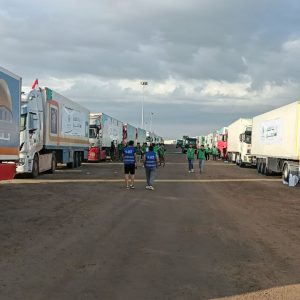‘Faceless killer’: Syria landmines keep sowing death
Damascus, Syria – AFP
Airstrikes and shelling have been responsible for many of the Syrian war’s half million deaths, but remnants of explosives laid by all sides in the 11-year conflict are now claiming more lives in Syria than anywhere else in the world, according to the United Nations.
21 family members spanning three generations lost their lives while out on a family trip in the Syrian countryside due to a landmine explosion. Abdul Aziz Oqab, 41, survived the tragedy, while losing his wife, two of his children, siblings and an uncle. Other relatives were maimed for life.
“It was a day of joy that turned into tragedy,” Oqab said. “I’ve come to hate going out since then. People live in fear of this faceless killer that could be anywhere.”
Since 2015, landmines and other explosive remnants have killed or injured five people every day, according to UN data.
“An entire family was destroyed,” Oqab said about the fateful day more than three years ago, sitting outside his mud hut in his village in Hama province.
“Death awaited us from inside the earth,” he said, surrounded by his orphaned nephews.
“This was our destiny.”
Zakia al-Boushi lost five relatives including her brother and mother in 2017 due to a landmine accident. Her surviving daughter was left so shell-shocked she has not uttered a word in five years.
“The mine tore us apart,” Boushi said.
The UN Mine Action Service says 15,000 people have been killed or injured by explosive devices in Syria since 2015.
This is a “huge number”, said Habibulhaq Javed, who heads Syria’s UNMAS team. “Currently, Syria is reporting the highest number of victims caused by explosive ordnance globally.”
Syria’s war is estimated to have killed almost 500,000 people and displaced millions since it began in 2011.
About 10.2 million people- which is roughly half of Syria’s entire population, lives in areas contaminated with explosive devices.
Mines have a long lifespan and stay lethal even longer if they are kept inside casings.
Syrian authorities detonate ammunition and explosive remnants of war on a near-daily basis, especially in areas formerly held by rebel forces near the capital.
In Syria’s rebel-held north, it is rescue workers who take on the daunting task of sweeping for landmines and detonating them. State support is visibly absent.
The White Helmets rescue group has even set up training and workshops to raise awareness on the dangers landmines pose.
Raed Hassoun of the White Helmets heads a de-mining center in Syria’s northwest that has neutralized about 24,000 explosive devices since 2016.
A lack of resources is depriving most of Syria’s towns and villages of vital mine clearance work.
The world body is struggling with limited funding for its de-mining programs, Javed said.
As a result, civilians have paid the price.











